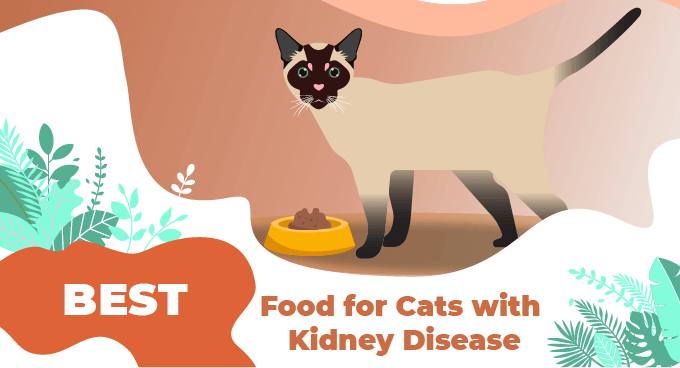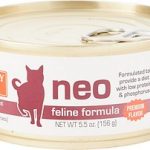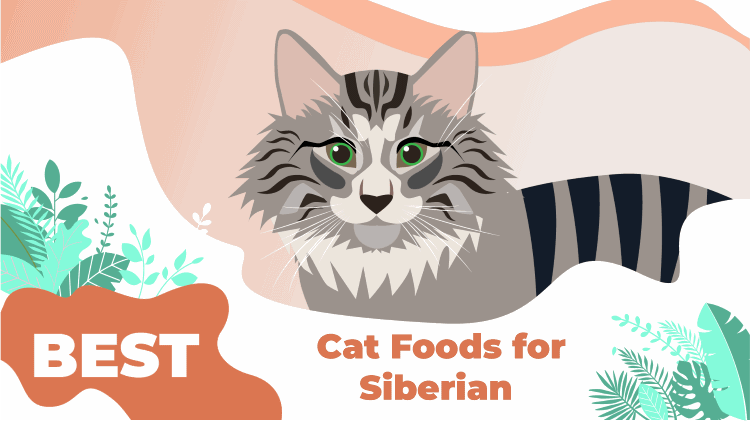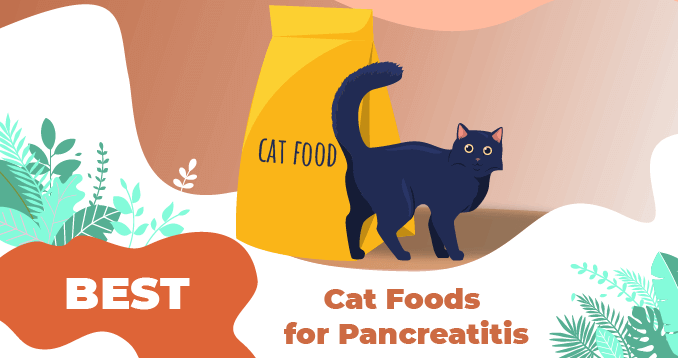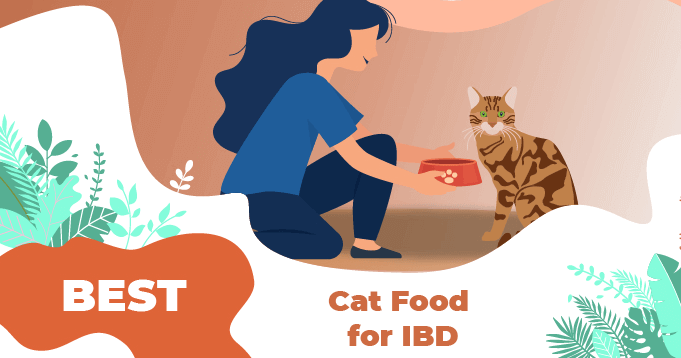Best Food For Cats With Kidney Disease
This page contains affiliate links. We may earn money or products from the companies mentioned in this post through our independently chosen links, which earn us a commission.
Cats with kidney disease often need a special diet that has lower protein than cats normally eat. The kidneys remove waste from the blood, manage blood pressure, stimulate bone marrow to make red blood cells, and make hormones.
But it’s not unusual for a cat’s kidneys to start to fail as a cat gets older. Left untreated, kidney disease can lead to some serious health problems for your cat.
Compare Best Food For Cats with Kidney Disease
|
Runner Up
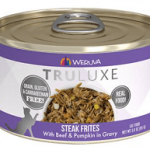
2. Weruva Truluxe Steak Frites with Beef & Pumpkin in Gravy Grain-Free Canned Cat Food |
Most Appetizing
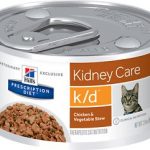
3. Hill's Prescription Diet k/d Kidney Care Chicken & Vegetable Stew Canned Cat Food |
Premium Choice
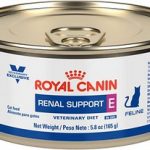
4. Royal Canin Veterinary Diet Renal Support E Canned Cat Food |
Most Popular
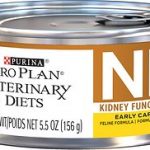
5. Purina Pro Plan Veterinary Diets NF Kidney Function Early Care Formula Canned Cat Food |
|
|
Protein
8% Min |
Protein
10% Min |
Protein
4% Min |
Protein
9% Min |
Protein
6.5% Min |
|
Fat
10% Min |
Fat
1.3% Min |
Fat
3% Min |
Fat
5.1% Min |
Fat
3% Min |
|
Fiber
1% Max |
Fiber
0.5% Max |
Fiber
1.5% Max |
Fiber
2% Max |
Fiber
3% Max |
|
Moisture
78% Max |
Moisture
86% Max |
Moisture
78% Max |
Moisture
79.5% Max |
Moisture
77% Max |
|
Caloric Content
1,316 kcal/kg |
Caloric Content
72 kcal/3 oz can |
Caloric Content
70 kcal/2.9 oz can |
Caloric Content
171 kcal/can |
Caloric Content
162 kcal/can |
However, if kidney disease is diagnosed early and your cat receives good care, as well as a good diet, you can help him live a longer, happier life.
Causes Of Kidney Disease In Cats
There are two types of kidney failure in cats:
Acute Renal Failure
Acute renal failure in cats has a sudden onset. It can spring up over the course of a few weeks or even a few days. It can occur in cats of any age. Causes include:
- Toxins/poisons. Toxins are the most common cause of acute renal failure. They can include items such as antifreeze, toxic plants such as lilies, household chemicals, pesticides, cleaning fluids, and some human medications. For cats, even one ibuprofen pill can result in the kidneys going into renal failure. You should check your garage and yard often for these substances to make sure your cat can’t come into contact with them.
- Trauma. Trauma, especially involving a burst bladder or broken pelvis, can result in acute renal failure.
- Shock. A cat that goes into shock due to losing lots of blood can go into acute renal failure.
- Overheating and dehydration. A cat that experiences rapid dehydration or which overheats in hot weather can suffer from renal failure. Overexertion, vomiting, and diarrhea can all cause a cat to lose a lot of fluids and go to into renal failure.
- Infection. A kidney infection can lead to acute renal failure.
- Blockages. A blockage that alters the flow of blood into the kidney and the flow of urine from the kidney can result in renal failure. This can occur in a male cat that is unable to urinate because of a urethral blockage.
- Heart failure. Heart failure with low blood pressure can reduce the flow of blood to the kidneys, leading to acute renal failure.
If your cat’s condition is diagnosed quickly enough, acute renal failure can often be reversed and your cat can return to normal health.
Chronic Renal Failure
Chronic renal failure is the other kind of kidney failure in cats. It is often harder to overcome than acute renal failure.
It usually appears in cats that are middle-aged and older and can develop over the course of months or years.
If you have a cat that is 7+ years of age, you should pay special attention to the possibility of chronic renal failure and be mindful of the symptoms.
There is no cure for chronic renal failure but, if diagnosed early, it can be managed.
Many cats can live three years or longer after they are diagnosed with chronic renal failure, if they receive good management of their disease.
The exact causes of chronic renal failure are uncertain but they can include:
- Kidney infections and blockages. Infections and blockages of the kidneys may not cause acute renal failure but they can slowly affect your cat’s kidney function for months or years.
- Other health problems. Other health conditions that affect your cat, ranging from thyroid disease to dental problems to cancer, can all take a toll on your cat’s kidneys over time.
Symptoms Of Kidney Disease In Cats
There are many different symptoms of kidney disease in cats. Some of them are general symptoms that could indicate other possible health problems.
If you see some of these symptoms, take your cat to your veterinarian.
Remember that the earlier your cat is diagnosed with a kidney problem, the better chance you have to manage the disease and help your cat live a long, happy life.
Here are some of the common symptoms of kidney disease in cats:
- Frequent urination. This does not mean that the kidneys are working well. It means that your cat is having difficulty holding water in his body. He may also pee outside the litter box.
- Excessive thirst. Cats with kidney disease and renal failure will drink lots of water.
- Loss of appetite and weight loss.
- Mouth ulcers, especially on the tongue and gums.
- Extremely bad breath.
- The tongue may appear brown.
- Vomiting, diarrhea, and urine that is bloody or cloudy.
- Constipation.
- Weakness, lethargy, indifference.
- The cat’s coat can become dry and brittle.
- The bladder and kidneys may develop bacterial infections.
If you suspect that your cat has kidney disease (either acute or chronic), your veterinarian can run tests to make a diagnosis.
While cats are obligate carnivores and need plenty of meat in their diet usually, cats that have kidney disease need a special diet. It should be low in phosphorus and protein and enriched with Vitamin D and omega-3 fatty acids.
According to Cornell University’s Feline Health Center, sodium content should also be restricted. Electrolyte imbalances can be common with cats that have renal failure so less phosphorus and less salt can help control these problems.
They also recommend foods that are high in water-soluble vitamins, fiber, and antioxidant concentrations, along with restricted levels of protein and phosphorus. Cornell recommends therapeutic, i.e., prescription or veterinary diets, for cats with kidney disease.
Many studies seem to show that feeding cats the low protein/low phosphorus/low salt diet helps them with chronic renal failure and the diet appears to extend their lives.
However, some veterinary nutritionists believe that cats with kidney disease might do better eating a diet that has very high quality protein.
This kind of food should theoretically produce little waste for the kidneys to handle, so it would be easier for them to cope with.
This subject is being debated. We think there is currently more evidence for the low protein, low phosphorus, low sodium diet for cats with kidney disease so our food recommendations are based on those studies.
What To Look For When Choosing A Food For A Cat With Kidney Disease?
Cats with kidney disease can lose their appetite. This is especially true with cats that have chronic renal failure.
These cats can be suffering from some stomach acid secretions. Some of the therapeutic foods that are low in protein, phosphorus, and salt are not always very appealing to cats, so if you are feeding one of these foods on the advice of your veterinarian, you may need to be very patient with trying to get your cat to eat it.
A prescription diet can be important for a cat with kidney disease, but it’s even more important that your cat eats something, even if it’s not the prescribed food.
Your cat has to keep eating so he can get better.
We can suggest some possible foods for your cat but you should discuss any non-prescription food with your veterinarian before feeding it.
If your cat refuses to eat anything, we suggest asking your veterinarian for an appetite stimulant. In some cases a stimulant can encourage a cat to start eating again.
Obviously, you will need to make any food transitions very slowly with your cat. Cats can be picky eaters at the best of times and when a cat is coping with kidney disease, a food change can be very difficult.
Things to look for when choosing a cat food for a cat with kidney disease:
- Canned/wet food is recommended over dry food;
- Lower or restricted protein;
- Lower or restricted phosphorus;
- Lower or restricted sodium;
- The company should have veterinary nutritionists on staff to formulate the food;
- Choose a company that has top quality control measures;
- Choose a company that invests in cat food nutritional research.
Whenever you are considering prescription or veterinary foods, the research and quality control measures of the company are important considerations.
Prescription foods aren’t exactly medications but they do have a therapeutic purpose. You need to be certain that the food meets the required standards to help your cat.
If your cat refuses to eat the veterinary food prescribed by your vet, look for commercial cat foods that meet these same requirements.
Hopefully you can find one that is more palatable to your cat. It’s very important that your cat eats a food that has less than 0.5 percent phosphorus on a dry matter basis (DMB). You may not be able to find a phosphorus level this low in the U.S. because that’s the minimum allowed by AAFCO.
If you can’t find a food with a phosphorus level this low, look for a food that has a phosphorus level between 0.75 and 1 percent.
That might be a more realistic goal with commercial cat foods. Remember that the goal is to find a lower protein, lower sodium and lower phosphorus-containing food that your cat will willingly eat.
Best Commercial Foods For Cats With Kidney Disease
Most of the foods listed here are prescription cat foods. If your cat is diagnosed with kidney disease, especially with chronic renal failure, it’s likely that your veterinarian will recommend feeding your cat with one of these foods or something similar.
If your cat will eat the prescription food options, that’s great. If not, Weruva and Hi-Tor are both commercial brands that don’t need a prescription.
HI-TOR Veterinary Select Neo Diet for Cats Canned Food
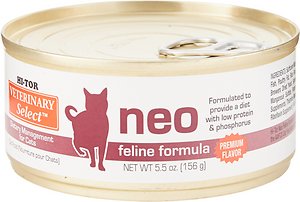
Product Info
- Protein: 8% Min
- Fat: 10% Min
- Fiber: 1% Max
- Moisture: 78% Max
- Caloric Content: 1,316 kcal/kg
Hi-tor Veterinary Select Neo Diet for Cats Canned Food is a commercial food used for cats with kidney disease. According to the company, it can be fed instead of Hill’s Prescription Diet k/d.
The Neo formula has 8 percent minimum crude protein, 10 percent minimum crude fat, 0.10 percent minimum phosphorus, 1 percent crude fiber, and 78 percent moisture. Sodium information isn’t provided.
Featured ingredients include Meat By-products, Chicken, Animal Liver, Beef, Poultry Fat, and Ocean Fish. Hi-Tor’s commercial foods cost less than prescription cat foods.
This could be a food to consider, especially if you will be feeding your cat a special diet on a long-term basis.
Weruva Truluxe Steak Frites with Beef & Pumpkin in Gravy Grain-Free Canned Cat Food
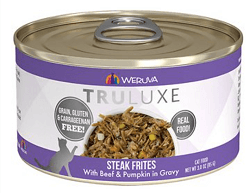
Product Info
- Protein: 10% Min
- Fat: 1.3% Min
- Fiber: 0.5% Max
- Moisture: 86% Max
- Caloric Content: 72 kcal/3 oz can
The Truluxe steak frites recipe has 0.57 percent phosphorus (DMB) and 0.22 percent sodium (DMB). Those figures are rather low, especially for a commercial cat food.
The protein is a little higher than we might like (61.9 percent DMB) but it’s good quality protein.
We think this would be a good food for many cats with kidney disease. If you check carefully, you may find other Weruva canned cat foods that would be suitable for your cat with renal disease.
Hill's Prescription Diet k/d Kidney Care Chicken & Vegetable Stew Canned Cat Food
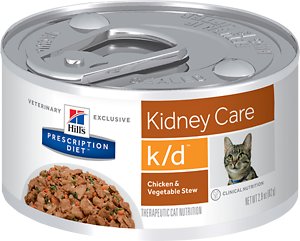
Product Info
- Protein: 4% Min
- Fat: 3% Min
- Fiber: 1.5% Max
- Moisture: 78% Max
- Caloric Content: 70 kcal/2.9 oz can
This kidney care formula has controlled levels of phosphorus and sodium; and therapeutic levels of L-Carnitine (an amino acid) and omega-3 fatty acids.
It supports your cat’s kidney function and helps sustain muscle mass.
Chicken and pork liver are the first ingredients. Hill’s has several other prescription foods for cats with kidney disease if your cat doesn’t like this recipe.
Royal Canin Veterinary Diet Renal Support E Canned Cat Food
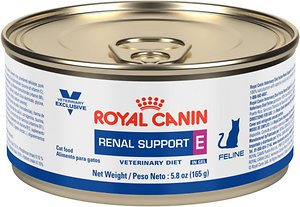
Product Info
- Protein: 9% Min
- Fat: 5.1% Min
- Fiber: 2% Max
- Moisture: 79.5% Max
- Caloric Content: 171 kcal/can
The Royal Canin Renal Support Diets come in several wet and dry versions so if your cat doesn’t like this recipe, he might like a different formula.
The diets can be mixed or rotated to provide more feeding options to appeal to your cat.
This food features pork by-products, chicken liver, chicken, and chicken by-products. It is low in phosphorus and protein. This renal support diet also includes a complex of antioxidents and EPA/DHA.
Purina Pro Plan Veterinary Diets NF Kidney Function Early Care Formula Canned Cat Food
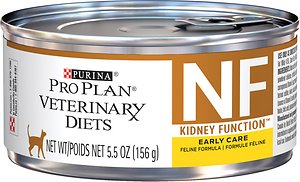
Product Info
- Protein: 6.5% Min
- Fat: 3% Min
- Fiber: 3% Max
- Moisture: 77% Max
- Caloric Content: 162 kcal/can
It has a moderate amount of high quality protein; a restricted amount of phosphorus; and omega-3 fatty acids as a source of EPA and DHA. It also contains antioxidants and most cats like the taste.
The food is available in both a dry and canned version. The canned version features meat by-products, liver, rice, and chicken by-products.
This food is for “early care” of a cat diagnosed with kidney disease. Purina Pro Plan Veterinary Diets also makes a formula for cats that require advanced care of their kidney condition.
Conclusion
Please remember that protein doesn’t cause renal disease in cats or any other animals.
Cats need meat protein, and diets that are high in protein are normally very good for your cat.
Even if your cat has very mild kidney issues, you probably don’t need to worry about the protein in his diet very much.
What is important to remember is that your cat’s kidneys have to work harder when you feed low quality sources of protein and plant sources of protein.
If you are feeding your cat good quality sources of meat protein throughout his life, there is less waste for the kidneys to remove so they don’t have to work as hard.
Kidney disease and renal failure are complex subjects. Even experts don’t always agree on what to feed cats with renal disease.
Many cats with kidney issues will get better by following diets that are low in protein, low in phosphorus, and low in sodium content.
However, these diets don’t appeal to some cats, and some will refuse to eat prescription cat foods.
This can lead to weight loss and malnutrition. If your cat won’t eat a prescription diet, talk to your vet about other approaches and other foods to try.

